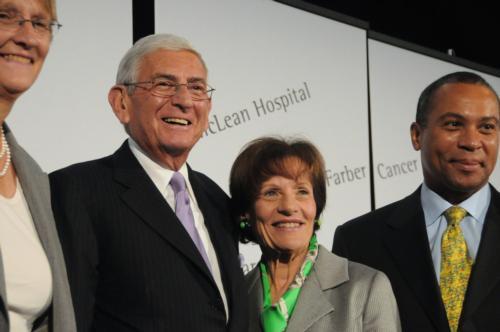
News
Summers Will Not Finish Semester of Teaching as Harvard Investigates Epstein Ties

News
Harvard College Students Report Favoring Divestment from Israel in HUA Survey

News
‘He Should Resign’: Harvard Undergrads Take Hard Line Against Summers Over Epstein Scandal

News
Harvard To Launch New Investigation Into Epstein’s Ties to Summers, Other University Affiliates

News
Harvard Students To Vote on Divestment From Israel in Inaugural HUA Election Survey
With $400 Million Gift, Future Secure for Harvard-, MIT-Affiliated Broad Institute
Broads, founding donors, hope that genomics powerhouse can build a $1 billion endowment

Just four years ago, Harvard and MIT launched a decade-long experiment to test an innovative organizational model for scientific discovery. Today, the results are in.
The Broad Institute, a unique joint effort between Harvard and MIT to bring genome-based information to medicine, received a $400 million gift from founding benefactors Eli and Edythe L. Broad. The gift marked the fourth anniversary of the institute.
The gift brings the total investment by the Broads to $600 million, dwarfing any donation given to either university. The new gift will enable the institute, founded soon after the completion of the Human Genome Project, to create its own endowment and establish itself as a permanent, standalone biomedical research organization.
The funds will be invested with the goal of growing the $400 million into a $1 billion endowment, which may require more gifts from other donors, Eli Broad said at a press conference following a series of speeches that included Mass. Gov. Deval L. Patrick '78, University President Drew G. Faust, and MIT President Susan Hockfield. Plans for the management of the funds have not yet been finalized.
The Broads, who made their fortune in Southern California real estate and founded two Fortune 500 companies, gave their first $100 million to the institute in 2003, intending that the gift would be spent over 10 years. The gave another $100 million gift in 2005.
Broad said that the endowment created by him and his wife would cover only about $20 million of the institute's annual $150 million budget, the rest of which would continue to be filled by federal grants.
“So we made this $100 million bet, then a $200 million dollar bet,” said Broad, a well-known philanthropist whose net worth is just under $6 billion, according to Forbes magazine. “Now we’re making a $600 million dollar bet that this will be the place in the world where the greatest scientific discoveries will take place.”
"We have made a lot of investments, but the investment to the broad institute is the largest investment we’ve made and it has yielded great results," Broad added.
In addition to the gifts from the Broads, the institute has received one other large gift: a $100 million donation in March 2007 from the Stanley Medical Research Institute to create a new center to study psychiatric disease, a move that backers said would jump-start the search for the genetic basis of bipolar disorder and schizophrenia. The Stanley Institute gift was the largest ever given for psychiatric disease research.
Since the genomic powerhouse was created several years ago, Broad said that it has grown to include a community of more than 1,200 of scientists from across MIT, Harvard, and Harvard's 17 affiliated teaching hospitals. The Kendall Square-based institute also currently has 330,000 square feet of laboratory space.
Experts say that the establishment of the Broad Institute has caused a spike in genomic and psychiatric research, with Broad-affiliated researchers having published some 350 scientific papers over the past four years.
“My rough estimate is that a scientific paper emerges about once every three days from collaborations that have come out of this institute,” Eric S. Lander, founding director of the institute and leader of the Human Genome Project, told The New York Times.
The institute has also been very successful at reeling in research grants, as it has won over 40 percent of the grants it has applied for, according to Broad. Reflecting this success, Broad researchers announced just this week that they had received a six-year $86 million grant from the National Institutes of Health to support research to identify and develop molecular tools to signal pathways and cellular processes crucial to human health and disease.
In light of its early and unchallenged success, the Broad Institute will now transition to a permanent non-profit organization, with both Harvard and MIT continuing to help govern it.
Lander said that the nature of a permanent endowment will allow for tackling long-term problems with “10-year horizons or longer.”
“This is about an expansion in time,” Lander said. “The goal is to put this endowment away for a period of years so when the gift [from the Broads] ends, there will be a permanent stream to continue that into the future.”
The growth of the Broad Institute comes as both Harvard and Massachusetts are increasing their investments in the life sciences.
Harvard has laid plans to stake much of its future growth on biomedical research, which will be the centerpiece of the University’s new $1 billion campus in Allston. The University is also investing heavily in the Harvard Stem Cell Institute.
At the same time, Patrick has made bolstering the Massachusetts life sciences industry—much of which is headquartered in Kendall Square near the Broad Institute—a hallmark of his governorship. One of the chief accomplishments of his first two years in office was the passage of an act that would invest $1 billion in stem cell and other biological research over the next decade.
—Staff writer June Q. Wu can be reached at junewu@fas.harvard.edu.
Want to keep up with breaking news? Subscribe to our email newsletter.
